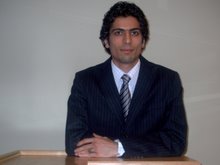
Forum in Toronto told that Canada must play a role in ending the use of children in battle
March 07, 2007 Nicholas KeungIMMIGRATION/DIVERSITY REPORTER
At 2, Behzad Pilehvar became a political prisoner, jailed in Iran with his anti-war parents.
At 7, he lost his best friend to an Iraqi air-raid bomb.
At 13, he started military training, learning in school how to defend his country as a Basij youth guard.
"We learned how to use Colt pistols, AK-47s and landmines, just like we learned math and geography in class. I still have nightmares from hearing the thundering shots from training in a firing range on a military base," recalls Pilehvar, whose family came to Toronto in 2003 as government-sponsored refugees.
"We were taught to kill for God and Islam." He pauses. "And the Western world was our enemy."
Thanks to his peace-loving parents, Pilehvar didn't actually become a child soldier like some of his friends, brainwashed teenagers who were sent into the 1980-88 war with Iraq, some to be used as suicide bombers or "canaries" to clear minefields.
Last evening, the slender man, now 25, joined a forum on children and armed conflict at the University of Toronto, part of a cross-Canada panel series sponsored by the United Nations Association in Canada to mark the 50th anniversary of the first UN peacekeeping mission (a brainchild of then-foreign affairs minister Lester B. Pearson, who proposed sending a multinational contingent to the Suez region to defuse tensions there in 1956.)
While the issue of child soldiers has captured public attention, the problem hasn't abated. In parts of Asia, the Middle East, Chechnya, Colombia and especially in African nations, government forces, militias and armed opposition groups conscript kids as young as 9 to fight or provide support for those who do. The UN estimates there were 250,000 child soldiers last year.
"Some of these children are taken away from their families and forced to join. Others have lost their parents, and becoming a child soldier is the only way out," explained panelist Kimmi Weeks, who is founder of the Philadelphia-based Youth Action International, which offers post-war rehabilitation to youth in West Africa.
"There are those who look at it as a rite of passage that'd give them the power that they would not otherwise have."
Having grown up amid Liberia's civil war, which began in 1989, Weeks, 25, knows first-hand the traumatic impact on children, who often end up repeating the cycle of violence.
Chol Kelei left his home in Sudan at 8, trekking from refugee camp to refugee camp through Ethiopia, Uganda and Kenya to survive.
"War started in Sudan in 1955. It stopped in 1972 and started again in 1993," said the 24-year-old, who managed to leave the Dadab camp with the help of the UN Association in 2003. He now lives in Winnipeg and travels as a speaker for children affected by armed conflict.
"Unfortunately, we all grew up in a generation of war and many of us don't even know anything other than war. No one knows what it means by peace."
Weeks said aid groups that appear in an emergency are often gone when the war ends. Little attention is paid to the mental health of the war children.
"When these kids become adults, they simply revert to war again," he explained.
While Pilehvar is taking courses at Seneca College to complete his interrupted civil engineering studies, he's pondering a switch to political science or journalism. He hopes to learn to use politics and media to bring about change in conflict regions.
"Canada is a country famous for human rights. Our government must do its best to prevent war and help children who have become victims of conflicts," Pilehvar said.

No comments:
Post a Comment